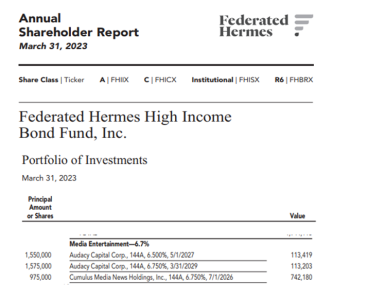Yes, but the ratings issue was not related to a decline in radio overall. That was just a reflection of how ABC was not keeping up.
Where have radio values increased in the last 17 years?
Yes, but the ratings issue was not related to a decline in radio overall. That was just a reflection of how ABC was not keeping up.
If broadcaster cash flow generation continues to decline and valuations continue to worsen, then losses on investment will worsen.
Nowhere in the U.S.Where have radio values increased in the last 17 years?
Nowhere in the U.S.
In many nations in Latin America stations are worth more than ever. Same with the national stations in much of Europe and a few places in Asia.How about outside of the U.S.?
Interesting. Why the disparity? I was in Italy over the summer, and everyone was glued to their i phones just like in the US. I haven't been in South America in 20 years, so I really can't talk about those countries.In many nations in Latin America stations are worth more than ever. Same with the national stations in much of Europe and a few places in Asia.
And that equity today is worth, maybe, 15% of the original loan values of the multiple involved lenders.I'm talking about broadcasting. In the iHeart settlement, the lenders got about 97% equity in the company.
But the "BCF" or broadcast cash flow is not being distributed to them as it all goes to debt service. They own non-performing assets. Sort of like a vacant storefront in downtown San Francisco.They're participating in the cash flow other revenue streams.
But it is very unlikely they will get much / most of that back. However, instead of a huge one-time write-off, they can write down some of the declining value each year and that looks better to the rest of the world.It's not a short term solution, but they didn't loan this money for the short term. Last I checked iHeart still owes $9 billion. So the lenders didn't get screwed.
But how much will be paid at all?They just didn't get paid on time. But nobody forced them to lend the money either. The post I was responding to implied that these companies walk away without any obligation.
Radio is easier to buy in many of those countries. For example, in Peru you can buy several formats from each of several groups and cover the whole country with two or three buys. So radio is used vastly more for campaigns.Interesting. Why the disparity? I was in Italy over the summer, and everyone was glued to their i phones just like in the US. I haven't been in South America in 20 years, so I really can't talk about those countries.
But how much will be paid at all?
But how long ago was that? The financial environment for traditional media was just starting to get bad. It's even worse now.The late Teddy Forstmann looked at his investment in Citadel as the company was heading towards bankruptcy. He had the ability to save the company with more money. He felt he had already been paid back enough by that time, and was willing to walk away. Why did it work for Teddy?
Mark, do the Fields take a haircut too in a pre-pak, or do they come out smelling like a rose and only the creditors get slammed?I agree such negotiations are likely ongoing. I suspect the sides are too far apart on terms and that a true prepack won't be possible.
Mark, do the Fields take a haircut too in a pre-pak, or do they come out smelling like a rose and only the creditors get slammed?
Mark, do the Fields take a haircut too in a pre-pak, or do they come out smelling like a rose and only the creditors get slammed?
It's got to be tough to go from being the Boss to answering to the Banks, especially for David, who grew up in the business. On the other hand, no one forced them to do the CBS deal.Most likely the Fields will receive little to no equity in a newco out of the gate. If creditors wish to retain executive management, the managers will probably be able to earn stock or stock options over time as part of a management incentive plan.
If the Fields were to infuse a very significant portion of their personal wealth into the company as part of a reorganization, only then would they receive some appreciable amount of either debt or equity in the newco.
My guess is they'll choose to hang onto their personal liquidity and be content with continued roles in the company (assuming the creditors are willing to allow them to keep their board seats, and in the case of David, his CEO role as well).
I'd bet that the new board would want new corporate leadership. Existing might be able to keep a certain equity stake, but non-controlling.If the Fields were to infuse a very significant portion of their personal wealth into the company as part of a reorganization, only then would they receive some appreciable amount of either debt or equity in the newco.
My guess is they'll choose to hang onto their personal liquidity and be content with continued roles in the company (assuming the creditors are willing to allow them to keep their board seats, and in the case of David, his CEO role as well).

